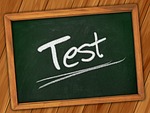Written tests can and should empower students!
“We need to learn to measure what is important, not to
treat what we can measure as important.”
~Attributed to Steve McNamara
Faculty Development Workshop Purpose and Focus
- To develop the expertise (knowledge, skills. and dispositions) needed to create and administer effective written tests
- To develop skills and attitudes for grading and returning tests
- To help students sharpen their test-taking skills
- To develop a personal philosophy of written tests
- To use tests as learning experiences.
Overview
Depending upon why and how written tests are constructed, administered, graded, and returned, they can be either a positive or negative learning experience for students and instructors.
Top 23 Learning Objectives
By successfully completing this workshop, participants should be able to demonstrate their expertise in crafting a written test that serves as an effective assessment tool. This will be evident as participants:
- Compare and contrast reasons for administering various types of written tests.
- Debate the usefulness of written tests for students and instructors.
- Determine criteria for selecting testing items.
- Summarize reasons for aligning test questions with learning objectives.
- Explain ways to avoid ambiguous test questions.
- Discuss strategies that help clarify expected answers, such as to operationalize terms.
- Predict how the first few test questions will impact students.
- Discuss steps to avoid when creating a test.
- Debate strategies for preparing students to take a test.
- Debate the pros and cons of study sheets and review sessions.
- Debate pros and cons of flash cards and digital flash card websites.
- Create various levels of test questions utilizing Bloom’s Taxonomy.
- Share strategies for administering a test.
- Discuss fairness in creating and grading a written test.
- Explore types of feedback helpful while grading and returning test papers.
- Propose steps to avoid when returning graded tests.
- Debate pros and cons of permitting absent students to make up a missed test.
- Discuss test follow-ups.
- Explore ways to use a test as a learning experience.
- Use a guide sheet to develop a personal philosophy of written tests.
- Create tips for students to consider prior to taking a test.
- Create tips for students to consider while taking a test.
- Create tips for students to consider after taking a test.
Handouts
Titles
- Nomenclature: Written Test Definitions
- Tips for Creating an Original Philosophy of Testing
- Best Practices for Creating Effective Written Tests
- Best Practices for Creating Effective Essay Questions
- Best Practices for Creating Effective True or False Questions
- Best Practices for Creating Multiple Choice Questions
- Best Practices for Polishing Test-Taking Skills
- Test Standards Checklist
- Bloom’s Taxonomy
- Quotations: Written Tests
- References and Resources: Written Tests
- Webliography: Written Tests Internet Resources
This faculty development workshop is available to serve as
Professional Development Hours.
Each participant, who successfully completes this
faculty development workshop,
will be awarded a “Certificate of Completion”.
Click to Contact Dr. Nesnick
or
E-mail: Victoria@VictoriaNesnick.com
or
Phone: (631) 889-2178

